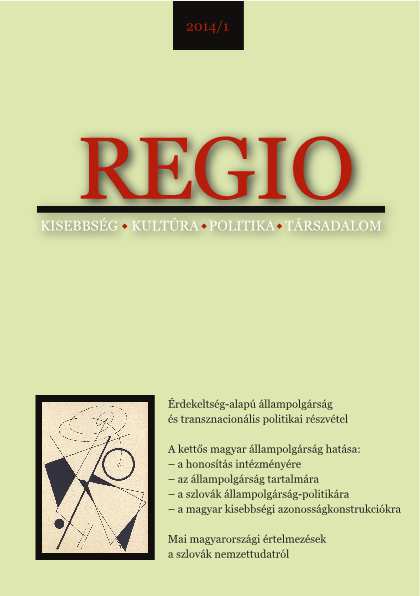
Test, identitás, nemiség - a két világháború közti prostitúció elemzése
Bokor Zsuzsa: Testtörténetek. A nemzet és a nemi betegségek medikalizálása a két világháború között Kolozsváron. Kolozsvár, Nemzeti Kisebbségkutató Intézet, 2013.
More...We kindly inform you that, as long as the subject affiliation of our 300.000+ articles is in progress, you might get unsufficient or no results on your third level or second level search. In this case, please broaden your search criteria.

Bokor Zsuzsa: Testtörténetek. A nemzet és a nemi betegségek medikalizálása a két világháború között Kolozsváron. Kolozsvár, Nemzeti Kisebbségkutató Intézet, 2013.
More...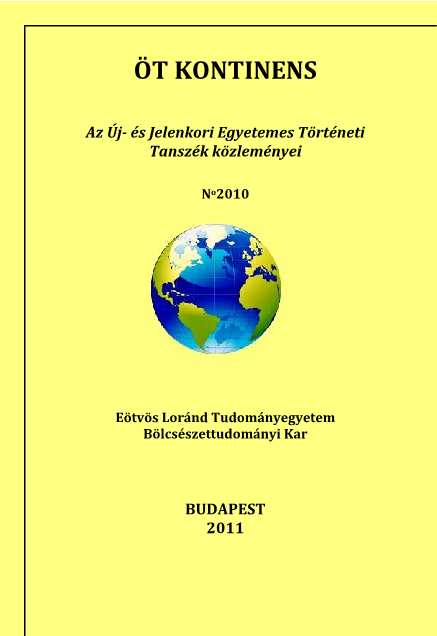
The study presents the First Czechoslovak Republic from 1918 to 1938 and examines the situation of the minorities.
More...
The study presents the Hungarian minorities, their main political formations and some persons interested in interwar Czechoslovakia.
More...
The study presents the German minorities, their political parties and persons in the interwar Czechoslovakia.
More...
The author presents the Slovak autonomist tendencies during the interwar period in Czechoslovakia.
More...
The author of this study presents the Czechoslovakian arms trade after the First World War to China
More...
The paper studies the 1930 crisis discourse of the Budapest Theater Directors' Association drawing on archival material held in the Theater History collection in the National Széchényi Library (OSZK). The first chapter analyzes the internal and external communication of the association reacting to the competition of foreign language talking pictures that appeared in Budapest at the end of 1929. The organization petitioned the ministries and the municipality of the Hungarian capital for the alleviation of their financial burdens as private theaters had been operating without financial subsidies and needed to secure the conditions of profitable operation. Beside a decrease of electricity, police and fire safety costs, the main goal of their lobbying was the abolition of the entertainment tax levied on private theaters, as well as imposing the tax on foreign language talking pictures. The second chapter discusses the reasons contemporary trade journals of actors and the film industry as well as trade unions used to explain the crisis of private theaters. Unlike theater directors who were highlighting the financial burdens, they emphasized operational and artistic reasons. In the third chapter, the problem of crisis management is discussed through the career of an influential theater personality. Imre Roboz as the president of the executive committee of the Budapest Theater Directors' Association very actively petitioned against the spread of foreign language talking pictures and movie studios. At the same time, as the director of the American-owned Vígszínház, he was appointed by Adolf Zukor to lead Hungarian language talking picture making in the Paris studio of Paramount from the summer of 1930. I point out these parallel strategies of crisis management through the analysis of documents held in Vígszínház and the Theater History collection of the OSZK.
More...
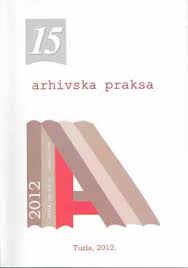
By studying the activities of nationalist organizations in Bosnia and Herzegovina, were involved in very few historians of Bosnian provenance. In current historiography her there is no work on the action Croatian National Youth (HANA) in Bosnia and Herzegovina. The authors are based on original material presented establishment and operation of Hana, as one of the factors in the creation of political and social life in Bosnia and Herzegovina in the Kingdom of Serbs, Croats and Slovenes (SHS K). organization his action showed association with Croatian political parties acting in the political arena K SHS. Her acts of terrorism and conflicts with pro-regime nationalist organizations in Bosnia and Herzegovina were intense.
More...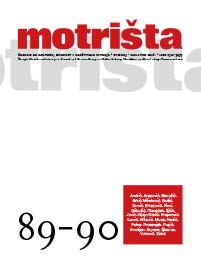
U radu se govori o atentatu na hrvatske zastupnike u Narodnoj skupštini u Beogradu, 20. lipnja 1928. te dijelu reagiranja Hrvata iz BiH nakon atentata, prije svega – Hrvatske seljačke stranke (HSS-a), Hrvatske pučke stranke (HPS-a) i dijela franjevaca u BiH koji su podržavali HPS. Također, prikazana je uloga državnih vlasti u pripremi i izvedbi samog atentata te progonima Hrvata koji su javno govorili o spomenutom zločinu. Hrvati u BiH, nakon atentata, pokazali su zajedništvo u osudi zločina, ali isto tako i podjele oko sudjelovanju Hrvata u novoj Vladi Kraljevine Srba, Hrvata i Slovenaca.
More...
The general aim of this research is to study the relationship between the Executive power and the Parliament during World War I and in particular, to analyse the effects of war legislation on the Italian legal system. It was observed that both as an immediate effect of the war and by way of the social necessities that were its direct consequence, the Italian executive was forced to “invade” the field of private law, thus generating measures on the basis of which changes in different legal institutions would follow. A part of this legislation was destined to persist even after the end of the war, as it was only the beginning of a series of changes that were already underway in society, and for which the conflict was to be only the triggering effect.
More...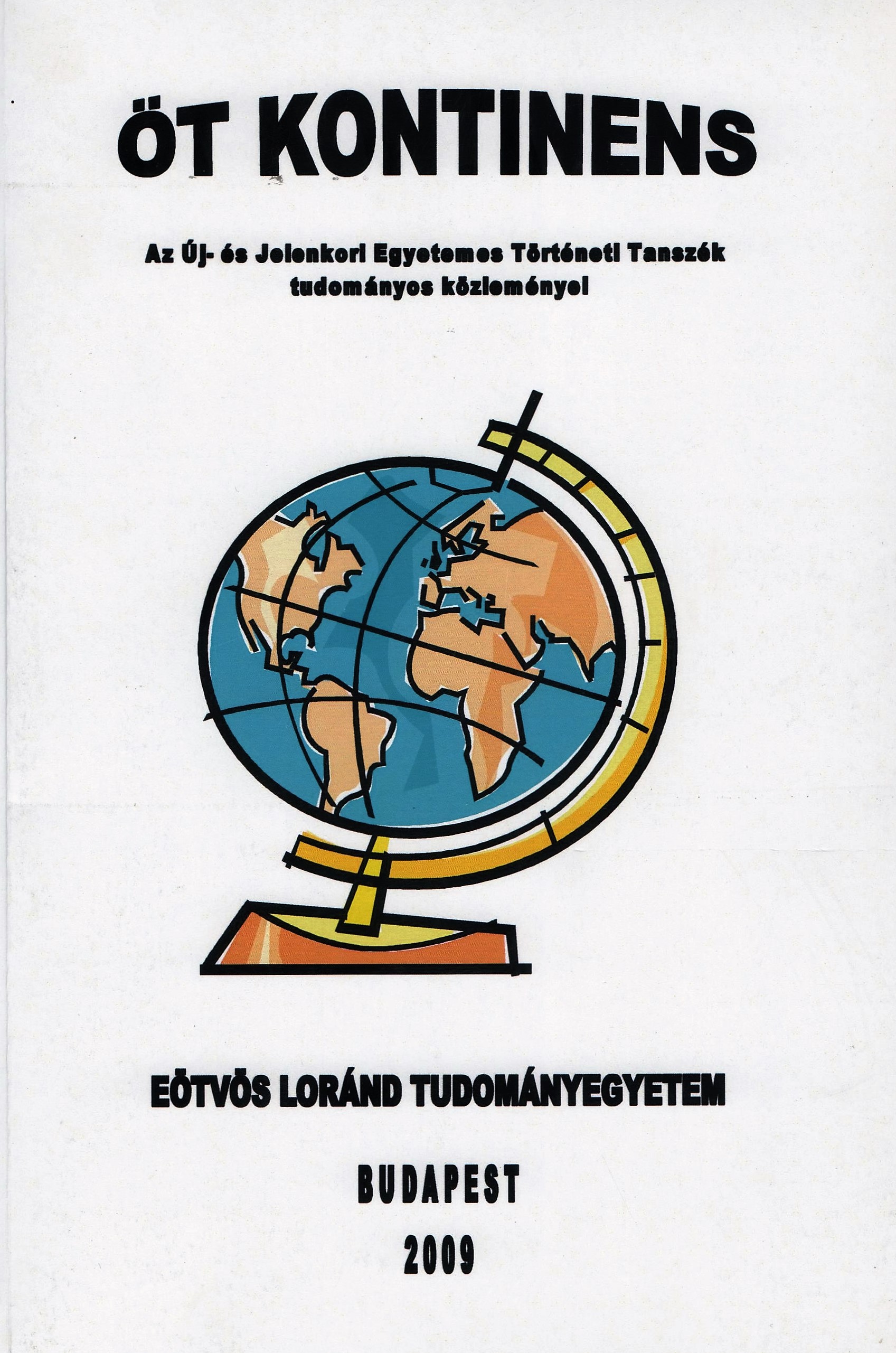
The impact of the Great Depression on the Danubian Basin. Plans to solve the economical questions of Central Europa. Using of Hungarian and British archival sources.
More...
About Locarno and the British-French negociations before this event, using British press and archival sources.
More...
Political situation of the first Czechoslovak Republic at the end of the 1930s. The role of count János Esterházy in the political life of the country.
More...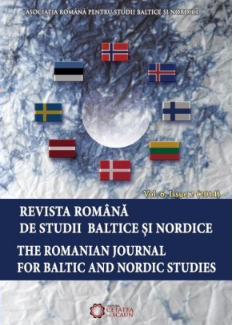
The research deals with a subject that has not been investigated previously, but is a significant topic in the historical memory of Latvian culture – participation and importance of nurses in the War of Independence of Latvia. Many nurses worked in the military units and war medicine institutions of the Latvian Army. They fulfilled their professional responsibilities with selflessness and often died in the line of duty. Unfortunately nurses’ role in this military conflict is not clarified. The objective of this paper is to study the role of nurses during the War of Independence of 1918–1920 and the impact of the activity of nurses related to the military sphere on historical memory. Chronological confines include the period of time from November 18, 1918, when the democratic and independent state of Latvia was established, till August 11, 1920, when the Peace Treaty was signed between Latvia and Soviet Russia. To reach that purpose, we need to look at many aspects – study the change of woman’s role at the beginning of the 20th century, especially under the circumstances of the World War I; consider the significance of the War of Independence in the region and investigate the contribution of nurses in the War of Independence, what professional responsibilities they fulfilled and what were the difficulties they encountered and, finally, how their commitment has been preserved in historical memory.
More...
The following discussion presents the initiative of one of the leading Slovenian liberal politicians in the first decades of the 20th century, Dr Vekoslav Kukovec, in the beginning of August 1924: that the liberals should withdraw from the ruthless political struggle against the Catholic side. When the leadership of the Slovenian liberal politics refused this initiative, Kukovec resigned. After this unsuccessful attempt at convincing the liberals to support the ideological appeasement in Slovenia, Kukovec’s efforts resulted in a debate between the liberal and Catholic side, in which both sides expressed the characteristic contemporaneous ideological rigidity of the cultural struggle. The “pium desiderium” — pious hope of Vekoslav Kukovec to put an end to this struggle did not come to pass. We can only speculate about how the Catholic side would have reacted had the liberal side offered ideological and political appeasement that Kukovec argued for. However, it is certain that by not doing so liberalism lost an opportunity to denounce the ideological intolerance and intellectual violence in Slovenia and thus exempt itself from the historical responsibility for the consequences. However, none of this happened. The Slovenian ideological complexes lived on and attained further painful dimensions.
More...
The territory of contemporary Slovenia, as a part of other state formations, has been an object of international community sanctions on several occasions in the last century. Our analysis encompasses two cases, in which the League of Nations introduced sanctions, namely threat of sanctions and the initiation of procedure against Kingdom of Serbs, Croats and Slovenes in 1921 due to its violation of state border with Albania set in 1913 and its military incursions on Albanian territory, and economic sanctions against Kingdom of Italy due to its military aggression against Abyssinia in 1935. The former case was a success because sanctions did have an effect and they brought about a solution of the problem even before they were formally introduced whereas the latter was a failure because it didn’t stop military aggression. The reasons for the success in the case of Kingdom of SCS are above all in less ambitious objective, in concordance of the League of Nations member states and in vulnerability of the object state, whereas the reasons for the failure of the Italian case were in inconformity of objectives and means, the former being too ambitious compared to the means applied, in the lack of concordance and decisiveness of the League of Nations member states, in non-comprehensiveness of economic sanctions, in the role of third parties and in nationalistic response of Italy to the sanctions.
More...
The following article presents the development of obstetrics and the State Gynaecological Hospital in Ljubljana. The women's trust in the Maternity Hospital as the best place to give birth developed gradually. The author of the article mostly based her research on the civil registers of the Maternity Ward of the State Gynaecological Hospital in Ljubljana for the period between 1 January 1929 and 31 December 1941. The registers are kept in the Archives of the Republic of Slovenia. By analysing the civil registers of the Maternity Hospital for the period between 1 January 1929 and 31 December 1941 the author established the identity of the women giving births there, their origin, as well as the nature of their social status and birth trends.
More...
On the basis of archive materials and literature, the following contribution presents the role of the Yugoslav Royal Guard Battalion, formed in Egypt in June 1941 as a unit of the Yugoslav Army in emigration. The battalion, established with the help of the representatives of the Yugoslav Committee from Italy, mostly consisted of Slovenians or inhabitants of the Primorska (littoral) region who joined the Yugoslav Army in emigration as volunteers and former Italian captives. Throughout its existence the battalion, consisting of 850 to a maximum of 1,000 well-trained soldiers, operated in the context of the British Army in the Middle East. In the end of 1943 and the beginning of 1944 the unit started disintegrating, since its soldiers trusted the battalion leadership and the propaganda of the Yugoslav government in exile less and less. The soldiers started leaning towards supporting the Tito’s partisans, who were shown by the propaganda as the only effective resistance movement in Yugoslavia.
More...
In the introduction the article discusses the concept of patriotism and its importance for the formation of the national identity. This is followed by the outline of the definition of nation through the process of statehood, which Slovenians had undertaken immediately after the dissolution of the Austro-Hungarian Monarchy — in the State of Slovenes, Croats and Serbs. During its formation Slovenians had strong patriotic feelings, and at the same time they felt profound disappointment and dissatisfaction with the once dominant German government structures. The formation of the State of SHS was exceedingly solemn, which the article tries to depict by describing the festivities at the moment when the state was established, when Slovenians, proud of their nation, language and culture, looked into the future with great expectations, imagining an idealised unification with the Serbian brothers in the Kingdom of Serbs, Croats and Slovenians. Gradually the time for sobriety arrived, indicating that Slovenians would once again have to fight for their own identity and the related cultural and linguistic characteristics andparticularities. This struggle was made harder by the mutual opposition between the political parties. In order to provide a more vivid presentation of the Slovenian patriotic feelings at the time, the article quotes excerpts from the memoirs of certain intellectuals at the time — astute observers of the contemporaneous social developments, which allowed them to overcome the spatially and temporally limited understanding of the future of the Slovenian political elites of that period. One of these intellectuals was Angela Vode.
More...